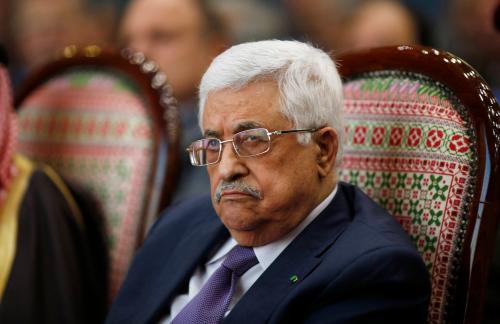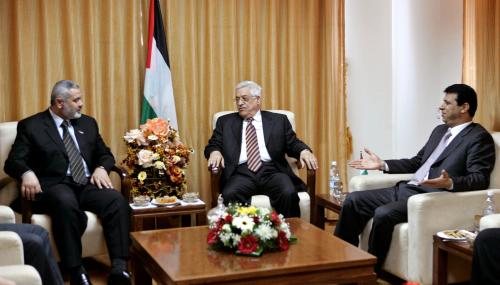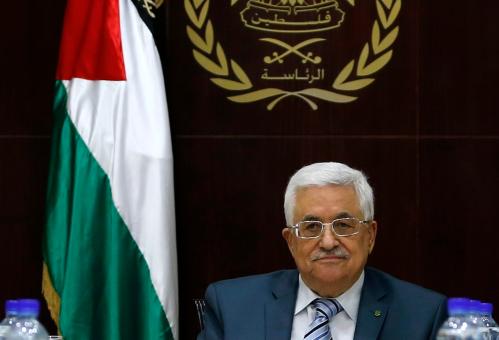Last week, Palestinian Authority (PA) Prime Minister Rami Hamdallah led a delegation of several hundred PA officials to the Gaza Strip for what he described as a “historic moment” in the quest to end the decade-old schism between the Fatah-dominated PA in the West Bank and the Hamas-ruled Gaza Strip. The delegation was dispatched by Palestinian President Mahmoud Abbas and marked the first convening of the PA in Gaza since Fatah, Hamas, and other factions agreed to form a “national consensus” government in 2014.
The PA’s arrival in Gaza was met with cautious optimism by the enclave’s beleaguered population, as well as considerable skepticism among Palestinians and outsiders alike. Four reconciliation agreements in six years have brought no real change on the ground. While such skepticism is not unwarranted, there are reasons to believe this time may be different.
For one, the regional environment has changed. The Saudi-led boycott of Qatar has preoccupied one of the Hamas government’s few remaining allies in the region. More important, Egypt appears to have resumed its role as chief sponsor of Palestinian reconciliation efforts. Following the 2013 overthrow of Egypt’s Islamist president, Mohammed Morsi, the regime of Abdel-Fattah al-Sissi tightened restrictions on Gaza and adopted a hostile attitude toward Hamas, accusing it (along with the now-banned Muslim Brotherhood) of fomenting instability in the neighboring Sinai Peninsula. The Sissi regime’s active involvement in Palestinian reconciliation talks, which have been overseen by Egyptian intelligence chief Khaled Fawzy, suggests a return to Egypt’s pre-2013 posture with regard to the Palestinians.
Egypt’s renewed interest in Palestinian reconciliation comes amid deteriorating conditions in Gaza, whose stability directly affects Egyptian national security. According to the United Nations, massive unemployment along with a lack of clean water, fuel, and adequate health and education services have effectively made Gaza “unlivable” for its two million inhabitants. Abbas’s decision last March to slash the salaries of PA employees and halt fuel payments that supply Gaza with electricity exacerbated the humanitarian crisis in the strip and raised the specter of yet another war.
The unprecedented punitive measures were prompted by Hamas’s formation of an “administrative committee” to run the day-to-day affairs of Gaza, which Abbas accused of serving as a “shadow government.” An agreement brokered by Abbas’s arch-rival and former security chief, Mohammad Dahlan, to supply Gaza with fuel from Egypt and the United Arab Emirates no doubt took Abbas by surprise, but demonstrated the lengths to which Egypt was willing to go to prevent further instability along its eastern border.
The internal Palestinian picture has also changed in significant ways. Hamas has new leaders, Ismail Haniyeh and Yahya Sinwar, who unlike the previous, diaspora-based leadership are both based in Gaza. Moreover, since 2014, Hamas has been eager to get out of the governing business. Despite its desire to give up administrative responsibility for Gaza, Hamas has been reluctant to fully hand over security control to the PA or surrender its weapons, which it claims are necessary so long as Israel’s occupation persists. Nevertheless, the group’s leaders have hinted at their readiness to make important compromises on the security front.
Abbas’s calculations also seem to have changed. While he remains reluctant to accept responsibility for Gaza—and its myriad social, economic, and security problems—the aging and increasingly unpopular Palestinian leader must also contend with questions of relevance if not legacy. The chances of achieving Palestinian statehood in the era of Netanyahu and Trump look increasingly remote. Moreover, without progress on reconciliation, Abbas is most likely to be remembered for having presided over one of the lowest points in the history of the Palestinian national movement. Although his attempts to strong-arm Hamas were somewhat offset by the Dahlan-Egypt deal, Hamas’s decision last month to disband the Administrative Committee allowed Abbas to claim victory. Indeed, the prospect of being upstaged by his longtime nemesis while being cut out of the process by key regional actors may have also helped Abbas overcome his reluctance to return to Gaza.
Even Washington is showing signs of change, however modest. Whereas previous reconciliation efforts had been roundly condemned by the United States, the Trump administration has refrained from rejecting the current arrangement outright, and instead welcomed “efforts to create the conditions for the Palestinian Authority to fully assume its responsibilities in Gaza” as key to improving the humanitarian situation in Gaza.
Whether this represents a genuine change in the U.S. approach to Gaza remains to be seen, particularly in light of Israel’s continued opposition. For his part, Prime Minister Benjamin Netanyahu firmly rejected the new arrangement, saying that Israel would not “accept bogus reconciliations” conducted “at the expense of our existence.” Despite Netanyahu’s strong words, Israel’s position remains highly conflicted, rejecting any sort of political role for Hamas while welcoming its security role in Gaza.
There are still many unanswered questions with regard to the status of Hamas’s weapons, the manning of Gaza’s border crossings, the fate of elections for the PA as well as the Palestine Liberation Organization (PLO), whether Israel will actively seek to disrupt the current reconciliation, and other issues. While it is still too early to tell how events will unfold, one thing is clear: In the absence of a coherent and unified Palestinian polity, there is little hope of ending Gaza’s humanitarian crisis, much less of resurrecting a credible peace process.
The Brookings Institution is committed to quality, independence, and impact.
We are supported by a diverse array of funders. In line with our values and policies, each Brookings publication represents the sole views of its author(s).











Commentary
What’s different about the latest Palestinian reconciliation effort?
October 9, 2017